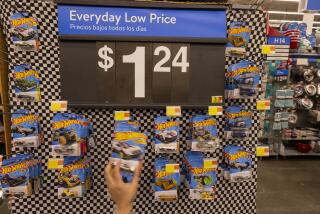Mobile payments may be the future, but they’re still unsafe
- Share via
It’s clear that many of us soon will be paying for stuff at the store with our smartphones. Wal-Mart, Target and a bunch of other retailers are the latest to jump aboard the mobile-payments express train.
But is it safe?
Doesn’t look like it, at least not yet.
A group of 14 merchants has unveiled a joint venture for mobile payments to compete with Google Wallet and other providers of such services. The group includes Wal-Mart, Best Buy and 7-Eleven, and they’re calling their service Merchant Customer Exchange, or MCX.
Billions of dollars in development cash is being thrown at so-called digital wallets, which banks and tech firms believe represent the future of shopping. All you’d do is wave your phone near a reader and -- presto! -- money is deducted from your bank account or charged to your plastic.
Mobile-payment transactions are expected to hit an estimated $600 billion worldwide by 2016, according to market researcher Gartner.
But a recent security conference in Las Vegas demonstrated that the technology may not be ready for prime time. Tech pros at the event showed the ease with which hackers could steal photos, surf the Web and even make phone calls from your device thanks to the mobile-payment system.
These systems rely on what’s known as near-field communication technology. This makes it possible for two devices to connect when in close proximity.
But that digital kiss also provides a window for hackers to jump in. Undoubtedly there will be ways to boost the security of mobile devices.
But at the moment, we’re not there. Which is why I’ll be sticking for a bit more to old-fashioned cash.
More to Read
Inside the business of entertainment
The Wide Shot brings you news, analysis and insights on everything from streaming wars to production — and what it all means for the future.
You may occasionally receive promotional content from the Los Angeles Times.











